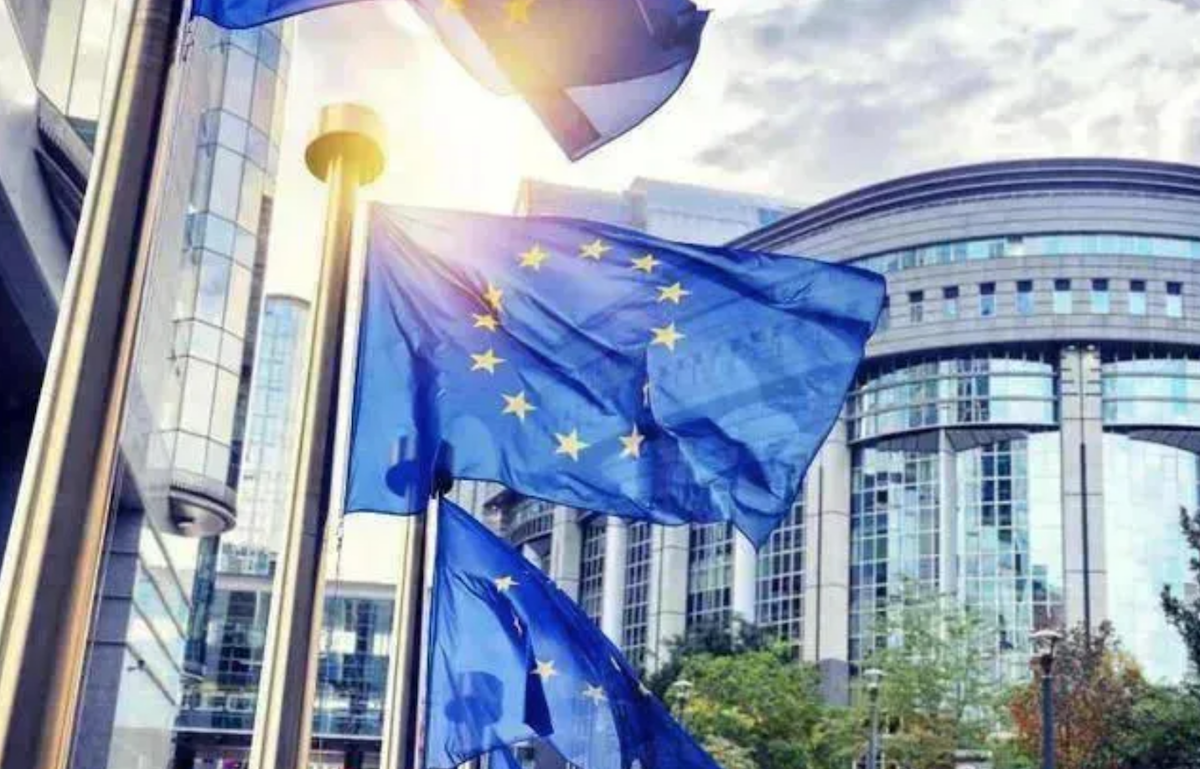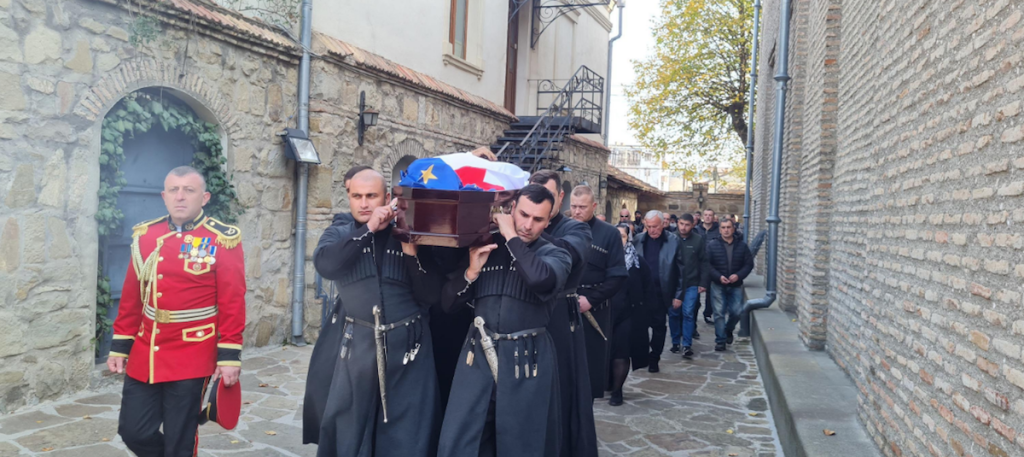Baku/23.11.23/Turan: Lawyers of the director and editor-in-chief of the online edition of “Abzas Media” – Ulvi Hasanli and Sevinj Vagifgizi appealed to the European Court of Human Rights in accordance with the Article 39 of the Rules of Court. This norm allows us to consider the appeal as a priority,…
Day: November 23, 2023

European Parliament resolution on Tamaz Ginturi murder
The European Parliament has adopted a resolution on the murder of Georgian citizen Tamaz Ginturi who was shot dead by Russian border guards on November 6, 2023 in the village of Kirbali.
The draft resolution, titled “On the murdered Georgian citizen Tamaz Ginturi and the abduction of Levan Dotiashvili by Russian occupation forces in the occupied Tskhinvali region of Georgia“, was prepared by several groups of the European Parliament, and its initiator is MEP Anna Fotiga.
552 MEPs took part in the voting on the resolution, 495 of whom supported it, while seven voted against.
The European Parliament categorically condemns the murder of Tamaz Ginturi and illegal detention of Levan Dotiashvili by Russian border guards in the zone of the Georgian-Ossetian conflict. It is emphasized that the perpetrators must be brought to justice, including representatives of the highest military and political echelons of Russia and the Investigative Committee of the Russian Federation.
 European Parliament resolution on the murder of Tamaz Ginturi
European Parliament resolution on the murder of Tamaz Ginturi
- The murder of Tamaz Ginturi: what happened, Tskhinvali’s version, what Georgian politicians say
- After Kirbali murder, Georgia’s opposition reminds parliament of the “Otkhozoriya-Tatunashvili List”
What the European Parliament resolution says:
● The murder of Tamaz Ginturi as well as the brutal murders of Georgian refugees Archil Tatunashvili, Gigi Octozoria and David Basharui, as well as the death of Irakli Kvaratskhelia at a Russian military base in the occupied region of Abkhazia, are a direct result of Russia’s occupation of Georgian territories.
● The European Parliament strongly condemns Russia’s illegal occupation of the Georgian regions of Abkhazia and Tskhinvali/South Ossetia, in clear violation of international law, and condemns the illegal “bordering” of these regions.
● Strongly condemns the discrimination against Georgian ethnic groups in the occupied territories, the violation of the right to education in one’s mother tongue, unlawful arrests, kidnappings and restriction of freedom of movement.
● The European Parliament expresses its continued support for the sovereignty and territorial integrity of Georgia within its internationally recognized borders, calls for the continuation of efforts to resolve the conflict peacefully and to stop the occupation of Georgian territory by Russia.
● The European Parliament calls on the Council of Europe to review the Oktozori-Tatunashvili list and impose sanctions on the individuals thereon.
● In June 2018, the Georgian Parliament approved the “Otozoria-Tatunashvili list,” similar to the U.S. Magnitsky List. The main purpose of the list is to protect the security of Georgian citizens in the zones of the Georgian-Abkhazian and Georgian-Ossetian conflicts.
● According to the resolution adopted by the Parliament, the list includes persons accused and convicted of murder, kidnapping, torture and inhuman treatment of Georgian citizens on these territories.
What happened in the village of Kirbali?
The village of Kirbali is located in the zone of the Georgian-South Ossetian conflict and is controlled by Russian border guards, as they see it as the state border of South Ossetia.
On October 25, information spread that Russians entered the territory of the Lomisi church located near the village and blocked the entrance to it for local residents. The head of the public relations service of the Georgian Patriarchate confirmed this information, adding that the border guards did so because “someone was waving a Georgian flag there”.
On November 6, Russian border guards killed Tamaz Ginturi near the church. Another Georgian citizen, Levan Dotiashvili, was kidnapped.
After his release, Dotiashvili said that first the Russian military fired a warning shot, after which Tamaz and Levan left the territory of the Lomisi church. They got into a car and managed to drive only a few meters when the soldier started shooting.
According to Levan Dotiashvili, after the wounded Tamaz Ginturi was pulled out of the car, seven more Russian soldiers appeared, one of whom hit Levan, forced him to lie on the ground and handcuffed him.
“I was taken away towards the forest, and I never saw Tamaz again. On the way there were insults and I was beaten,” says Dotiashvili.
The Georgian government is calling on the international community to condemn the killing.
President Salome Zurabishvili called the incident “a brutal attack on Georgian statehood.”
And Prime Minister Irakli Garibashvili, along with the international community, addressed Russian representatives and called for their cooperation. He said the killing once again confirms “the difficult security situation on the ground and speaks of the dire consequences of the occupation.”
Tamaz Ginturi was buried with military honors on November 11.

|
|
||||||||||||||||||||||||||||||||||||||||||||||||||||||||||||||||||||||||||||||||||||||||||||||||||||||||||||||||||||||||||||||||||||||||||||||||||||||||||||||||||||||||||||||||||||||||||||||||||||||||||||||||||||||||||||||||||||||||||||||||||||||||||||||||||||||||||||||||||||||||||||||||||||||||||||||||||||||||||||||||||||||||||||||||||||||||||||||||||||||||||||||||||||||||||||||||||||||||||||||||||||||||||||||||||||||||||||||||||||||||||||||||||||||||||||||||||||||||||||||||||||||||||||||||||||||||||||||||||||||||||||||||||||||||||||||||||||||||||||||||||||||||||||||||||||||||||||||||||||||||||||||||||||||||||||||||||||||||||||||||||||||||||||||||||||||||||||||||||||||||||||||||||||||||||||||||||||||||||||||||||||||||||||||||||||||||||||||||||||||||||||||||||||||||||||||||||||||||||||||
/cloudfront-us-east-2.images.arcpublishing.com/reuters/CTN42OEKNNISTKVMB26YYJRQHY.jpg)
LONDON, Nov 17 (Reuters) – Russian President Vladimir Putin waited three days before commenting on Hamas’ massacre of Israelis, which happened to take place on his 71st birthday. When he did, he blamed the United States, not Hamas.
“I think that many will agree with me that this is a clear example of the failed policy in the Middle East of the United States, which tried to monopolise the settlement process,” Putin told Iraq’s prime minister.
It was a further six days before Putin spoke to Israeli Prime Minister Benjamin Netanyahu to offer his condolences over the killing of around 1,200 Israelis. Ten days after that, Russia said a Hamas delegation was in Moscow for talks.
Putin, say Russian and Western policy experts, is trying to use Israel’s war against Hamas to escalate what he has cast as an existential battle with the West for a new world order that would end U.S. dominance in favour of a multilateral system he believes is already taking shape.
“Russia understands that the U.S. and the EU have fully supported Israel, but the U.S. and the EU are now the embodiment of evil and cannot be right in any way,” Sergei Markov, a former Kremlin adviser, wrote in his blog, explaining Putin’s need to differentiate himself.
“Therefore, Russia will not be in the same camp with the U.S. and the EU. Israel’s main ally is the United States, Russia’s main enemy right now. And Hamas’ ally is Iran, an ally of Russia.”
Moscow enjoys an increasingly close relationship with Tehran – which backs Hamas and whom Washington has accused of supplying Moscow with drones for Ukraine which is locked in a grinding war of attrition with Russia.
Hanna Notte, a Berlin-based Russian foreign policy expert, told the Carnegie Russia Eurasia Center she thought Moscow had dropped its earlier, more balanced position on the Middle East and adopted “quite an overt pro-Palestinian position”.
“In doing all of this, Russia understands very well that it aligns itself with constituencies across the Middle East and even beyond – in the Global South, in their views on the Palestinian issue where the Palestinian cause continues to resonate,” she said.
It is precisely those constituencies which Putin is seeking to win over in his drive for a new world order that would dilute U.S. influence.
“The most important way in which Russia stands to benefit from this crisis in Gaza is by scoring points in the court of global public opinion,” said Notte.
Putin has said that “when you look at the suffering and bloodied children (in Gaza), you clench your fists and tears come to your eyes.”
‘DOUBLE STANDARDS’
Russian politicians have pointedly contrasted what they say is the carte blanche that Washington has given Israel to bomb Gaza to Washington’s punitive response to Russia’s own war in Ukraine, where Moscow says it does not deliberately target civilians even though thousands of civilians have been killed.
Israel’s U.N. ambassador has said Russia is in no position to lecture others given what it has been doing itself in Ukraine.
But Senator Alexei Pushkov said the West had fallen into a trap of its own making by exposing its own double standards over how it treated different countries depending on its self-interested political preferences.
“The unequivocal support of the United States and the West for Israel’s actions has dealt a powerful blow to Western foreign policy in the eyes of the Arab world and the entire Global South,” Pushkov wrote on Telegram.
Russia also sees the crisis as a chance for Moscow to try to grow its clout in the Middle East by casting itself as a potential peacemaker with links to all sides, said former Kremlin adviser Markov.
Moscow has offered to host a regional meeting of foreign ministers and Putin has said that Russia is well placed to help.
“We have very stable, businesslike relations with Israel, we have had friendly relations with Palestine for decades, our friends know this. And Russia, in my opinion, could also make its own contribution to the settlement process,” Putin told an Arab TV channel in October.
There are potential economic benefits too, said Markov, and the added bonus of drawing Western financial and military resources away from Ukraine.
“Russia benefits from an increase in the price of oil which will result from this war,” said Markov. “(And) Russia benefits from any conflict that the U.S. and EU have to devote resources to because it reduces resources for the anti-Russian regime in Ukraine.”
Alex Gabuev, director of the Carnegie Russia Eurasia Center, said he believed Moscow had tilted its Middle East policy because of the war in Ukraine.
“My explanation is it’s because the war is becoming the organising principle of Russian foreign policy and (because of) ties with Iran, which brings military materiel to the table. The central Russian war effort is more important than, for example, the relationship with Israel.”
WORSENING TIES
Russia’s ties with Israel, traditionally close and pragmatic, have suffered.
Moscow’s reception of a Hamas delegation less than two weeks after the Oct. 7 massacre angered Israel, prompting it to summon Russia’s ambassador, Anatoly Viktorov, for sending “a message legitimising terrorism”.
The discontent was mutual; Alexander Ben Zvi, Israel’s ambassador, has been summoned for talks with the Russian foreign ministry at least twice and the two countries’ U.N. envoys have traded harsh words after Moscow’s representative questioned the scope of Israel’s right to defend itself.
Mikhail Bogdanov, one of Russia’s deputy foreign ministers, has said that Israel has stopped routinely warning Moscow of air strikes against Russian ally Syria in advance.
When a since-suspended Israeli junior minister appeared to express openness to the idea of Israel carrying out a nuclear strike on Gaza, Russia said the remarks raised “a huge number of questions” and queried whether it amounted to an official admission from Israel that it had nuclear weapons.
Amir Weitmann, chairman of the libertarian caucus in Netanyahu’s Likud party, has said Israel will one day punish Moscow for its position.
“We’re going to finish this war (with Hamas) … After this, Russia will pay the price,” Weitmann said in a stormy October interview with Russian state broadcaster RT.
“Russia is supporting the enemies of Israel. Afterwards we’re not forgetting what you are doing. We will come, we will make sure that Ukraine wins,” he said.
Reporting by Andrew Osborn; Editing by Mike Collett-White and Nick Macfie
Our Standards: The Thomson Reuters Trust Principles.
As Russia Chief Political Correspondent, and former Moscow bureau chief, Andrew helps lead coverage of the world’s largest country, whose political, economic and social transformation under President Vladimir Putin he has reported on for much of the last two decades, along with its growing confrontation with the West and wars in Georgia and Ukraine. Andrew was part of a Wall Street Journal reporting team short-listed for a Pulitzer Prize for international reporting. He has also reported from Moscow for two British newspapers, The Telegraph and The Independent.





